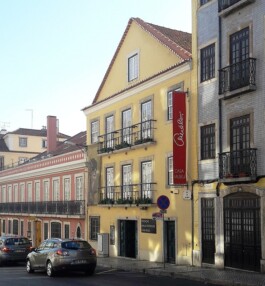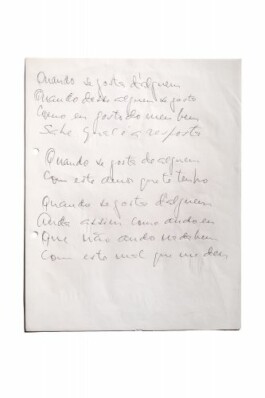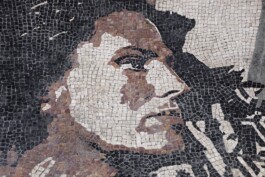


October 13 2022
Each week, discover one of the members of the Network of Houses and Museums of European Musicians. These places link the past, present and future, they honor a tangible and intangible heritage and fulfill an essential cultural purpose in Europe. This week discover the priceless cultural heritage of the "Voice of Portugal" through the Amália Rodrigues Foundation and House-Museum in Lisbon (Portugal).

Known as the "Voice of Portugal" or the "Queen of Fado" (Rainha do Fado), Amália Rodrigues (1920-1999), a singer with an exceptional voice, is at the origin of the worldwide popularity of this song. In 2011, this song became an Intangible Heritage of Humanity thanks to the immense contribution made by the musician. She recorded more than 170 albums during her life and was one of Portugal's most prestigious cultural ambassadors. The great singer of modest origins marked her contemporaries not only by her music but also by the exceptional relationship she maintained with her public. Audiences of all ages and social classes had a boundless love for 'Amália'. Even today, great Fado artists continue to be inspired by her rich career and many tributes are still paid to her.
Ai Mouraria, this traditional Portuguese song is one of Amália Rodrigues' first big hits. She composed it in Brazil in the mid-1940s. Amália performed many times in that country.
Last year, one of the great Fado artists, Mariza, revisited the repertoire of the Lisbon-born legend. A musical icon with an international outlook from the very beginning of her career. Amália made her first records in Brazil in the late 1940s. During the same time period, she gave concerts in France and Spain. In the early 1950s, she participated in a series of Marshall Plan-sponsored performances in Berlin, Rome, Trieste, Dublin, Bern and Paris. Like Pauline Viardot, the tutelary figure of the Centre Européen de Musique, she travelled all over Europe and the world during her flourishing career. Like Pauline Viardot, she also travelled to Russia (then USSR) to give concerts.


When Amália Rodrigues passed away on 6 October 1999, emotions ran high. In Portugal, three days of national mourning were declared. The Foundation that bears her name was created the same year, following the wishes expressed by the late Amália in her will. In 2001, the remains of the great artist were transferred to the church of Santa Engrácia. This transfer made her the first Portuguese woman to be honoured in the National Pantheon. On 23 July 2001, the Amália Rodrigues House-Museum opened to the public for the first time. It is located at number 193 São Bento Street, Lisbon, the house where Amália lived for 45 years (photo below). To honour Amália Rodrigues' wishes, the Foundation has preserved and studied, until today, a priceless heritage related to the singer and to Fado. The collections presented at the House-Museum reflect not only her career but also her tastes and affinities, allowing us to immerse ourselves in her daily life.

A collection of dresses, shoes and jewellery worn by the singer throughout her career is presented. Visitors to the House-Museum can also discover the countless awards and honours Amália Rodrigues received throughout her career, including the Legion of Honour awarded by President François Mitterrand in 1991. A rich collection of furniture, paintings and objects belonging to her can also be seen. The Foundation's archives are also invaluable. Innumerable letters, scores and manuscripts are preserved. An immense photographic heritage, some of which was never even seen by her contemporaries, is available. "These are more everyday photographs of the singer, far from the spotlight of the stage or the press cameras," as the foundation explains on its website.


The house-museum hosts a very rich collection of objects, works and writings of Amália Rodrigues.
In addition to the Amália Rodrigues Foundation and House Museum, there are many tributes to this great musician in Lisbon. Several works and murals represent her. A work of street art, created by the urban artist Vhils (photo below - © Bruno Lopes), adorns the pavements of the small square in the Rue de Sao Tomé in the popular Alfama district. Finally, one of the most pleasant places in the city bears her name: the Amália Rodrigues Garden. It is located on one of the highest plots of land in Lisbon and brings together a great diversity of landscapes.

More information on the Amália Rodrigues Foundation and House Museum: amaliarodrigues.pt
Until December 16, 2022, the documentary "We all have Amalia in our blood, Amália Rodrigues and the world of Fado" by the German director Hilka Sinning can be viewed in replay on Arte.
October 13 2022
Each week, discover one of the members of the Network of Houses and Museums of European Musicians. These places link the past, present and future, they honor a tangible and intangible heritage and fulfill an essential cultural purpose in Europe. This week discover the priceless cultural heritage of the "Voice of Portugal" through the Amália Rodrigues Foundation and House-Museum in Lisbon (Portugal).

Known as the "Voice of Portugal" or the "Queen of Fado" (Rainha do Fado), Amália Rodrigues (1920-1999), a singer with an exceptional voice, is at the origin of the worldwide popularity of this song. In 2011, this song became an Intangible Heritage of Humanity thanks to the immense contribution made by the musician. She recorded more than 170 albums during her life and was one of Portugal's most prestigious cultural ambassadors. The great singer of modest origins marked her contemporaries not only by her music but also by the exceptional relationship she maintained with her public. Audiences of all ages and social classes had a boundless love for 'Amália'. Even today, great Fado artists continue to be inspired by her rich career and many tributes are still paid to her.
Ai Mouraria, this traditional Portuguese song is one of Amália Rodrigues' first big hits. She composed it in Brazil in the mid-1940s. Amália performed many times in that country.
Last year, one of the great Fado artists, Mariza, revisited the repertoire of the Lisbon-born legend. A musical icon with an international outlook from the very beginning of her career. Amália made her first records in Brazil in the late 1940s. During the same time period, she gave concerts in France and Spain. In the early 1950s, she participated in a series of Marshall Plan-sponsored performances in Berlin, Rome, Trieste, Dublin, Bern and Paris. Like Pauline Viardot, the tutelary figure of the Centre Européen de Musique, she travelled all over Europe and the world during her flourishing career. Like Pauline Viardot, she also travelled to Russia (then USSR) to give concerts.


When Amália Rodrigues passed away on 6 October 1999, emotions ran high. In Portugal, three days of national mourning were declared. The Foundation that bears her name was created the same year, following the wishes expressed by the late Amália in her will. In 2001, the remains of the great artist were transferred to the church of Santa Engrácia. This transfer made her the first Portuguese woman to be honoured in the National Pantheon. On 23 July 2001, the Amália Rodrigues House-Museum opened to the public for the first time. It is located at number 193 São Bento Street, Lisbon, the house where Amália lived for 45 years (photo below). To honour Amália Rodrigues' wishes, the Foundation has preserved and studied, until today, a priceless heritage related to the singer and to Fado. The collections presented at the House-Museum reflect not only her career but also her tastes and affinities, allowing us to immerse ourselves in her daily life.

A collection of dresses, shoes and jewellery worn by the singer throughout her career is presented. Visitors to the House-Museum can also discover the countless awards and honours Amália Rodrigues received throughout her career, including the Legion of Honour awarded by President François Mitterrand in 1991. A rich collection of furniture, paintings and objects belonging to her can also be seen. The Foundation's archives are also invaluable. Innumerable letters, scores and manuscripts are preserved. An immense photographic heritage, some of which was never even seen by her contemporaries, is available. "These are more everyday photographs of the singer, far from the spotlight of the stage or the press cameras," as the foundation explains on its website.


The house-museum hosts a very rich collection of objects, works and writings of Amália Rodrigues.
In addition to the Amália Rodrigues Foundation and House Museum, there are many tributes to this great musician in Lisbon. Several works and murals represent her. A work of street art, created by the urban artist Vhils (photo below - © Bruno Lopes), adorns the pavements of the small square in the Rue de Sao Tomé in the popular Alfama district. Finally, one of the most pleasant places in the city bears her name: the Amália Rodrigues Garden. It is located on one of the highest plots of land in Lisbon and brings together a great diversity of landscapes.

More information on the Amália Rodrigues Foundation and House Museum: amaliarodrigues.pt
Until December 16, 2022, the documentary "We all have Amalia in our blood, Amália Rodrigues and the world of Fado" by the German director Hilka Sinning can be viewed in replay on Arte.


Playlist